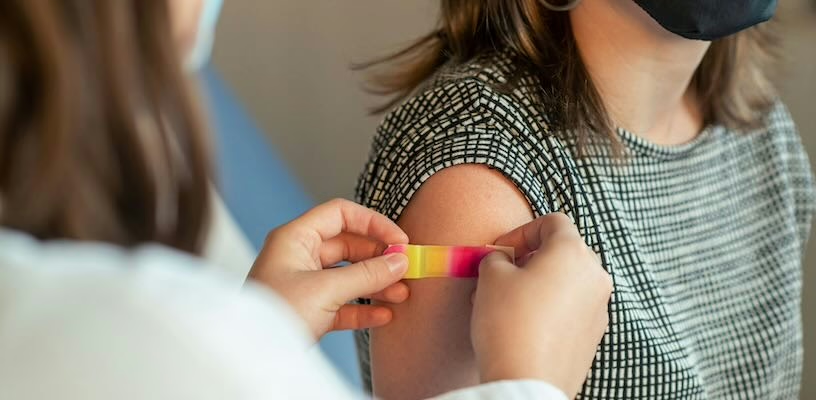Can You Get a Flu Shot While Pregnant?
When flu season rolls around, it’s smart to take extra measures to protect you and your little one by getting a flu shot.

- Is it safe to get a flu shot when you’re pregnant?
- Are there side effects to getting a flu shot while you’re pregnant?
- Are there ever times when you should avoid getting a flu shot?
- What are the benefits of getting a flu shot while pregnant?
- When is the best time to get a flu shot while pregnant?
- Where can you get a flu shot?
- What should you do if you can’t get a flu shot while pregnant?
- Final thoughts
These days, it may feel like you’re bombarded with information and advice everywhere you go, making it hard to know what’s true and what isn’t.
In the sea of health-related questions many moms-to-be have, one that stands out is whether you can get a flu shot during pregnancy. The short answer is yes—at least in most cases.
Below, we’ll explain why and when you should get a flu shot, and if there’s ever a reason to be cautious about getting one.
Is it safe to get a flu shot when you’re pregnant?
Yes, it’s safe to get an influenza (flu) vaccine shot while you’re pregnant.
Both the Centers for Disease Control and Prevention (CDC) and the American College of Obstetricians and Gynecologists (ACOG) recommend that pregnant women in any trimester get a flu shot. 1 2
What kind of flu shot should pregnant women get?
Pregnant women should get an injectable influenza vaccine (shot) instead of the nasal spray influenza vaccine.
The shot contains a type of inactivated (killed) flu virus, while the nasal spray vaccine is a live, attenuated vaccine, which could potentially infect you and your baby.
With that said, it’s fine to get the nasal spray after giving birth, even if you choose to breastfeed. 2
Are other vaccines safe during pregnancy?
Flu shots aren’t the only vaccines that you should get when you’re pregnant. There are a few other vaccines you should look into during pregnancy, such as:
- Tdap vaccine: This is one of the most important vaccines to get, as it will protect you and your baby from tetanus, diphtheria, and pertussis (whooping cough). Babies are particularly vulnerable to whooping cough and can’t get vaccinated against it until they’re 2 months old. Fortunately, you’ll pass antibodies to your baby through the placenta if you get your Tdap shot during your pregnancy. 3 Most doctors recommend this in the third trimester during pregnancy.
- COVID-19 vaccine: The COVID-19 vaccine is also safe to get during pregnancy. You’ll pass the antibodies from this vaccine to your baby during gestation, too. 4
- Respiratory syncytial virus (RSV) antibody shot: While this immunization is not technically a vaccine, it’s an antibody shot that will protect your baby from respiratory syncytial virus (RSV), a common virus that affects babies’ lungs and breathing passages. 5 This is generally recommended when women are due to deliver in the RSV season from 32 to 36 6/7 weeks from September through January
If you can’t remember what vaccines you’re up-to-date on or are otherwise unsure of which you’ll need, check with your doctor and try to keep track of them in your journal or pregnancy tracker app.
Are there side effects to getting a flu shot while you’re pregnant?
Whether you’re pregnant or not, you might experience mild side effects after getting a flu shot, including: 1
- Redness, soreness, and some swelling at the injection site
- Fever
- Headache
- Muscle aches
- Nausea
- Tiredness
These side effects may start shortly after you get the shot and last for 1–2 days. While they can be a bit uncomfortable, rest assured that people rarely have severe reactions to flu shots. 2
Are there other risks to getting a flu shot while pregnant?
You might have read rumors (especially online) that getting a flu shot during pregnancy can lead to pregnancy complications, such as miscarriage, autism, or birth defects in your baby.
Fortunately, these claims aren’t true. Many studies led by the CDC and its partners have debunked them. 1
Specifically, some people falsely believe that thimerosal, a mercury-based preservative that’s sometimes used in multi-dose vials of flu vaccines, can cause children to develop autism. There’s no scientific evidence to back this claim. 6 7
That being said, it’s possible to request a thimerosal-free version of the flu shot if you have other concerns.
Are there ever times when you should avoid getting a flu shot?
While experts recommend that most pregnant women get flu shots, there are a few situations in which it might make sense to avoid or delay getting vaccinated:
- You have severe allergies: If you had a severe allergic reaction to a flu shot in the past or have a severe allergy to any of the vaccine’s ingredients (except for egg protein), check with your doctor if you should sit this one out. 1
- You’re currently sick: You should also consult your doctor if you’re sick; they might suggest waiting until you’ve recovered before getting a flu shot.
Just to reiterate, if you think either of the above applies to you, talk to your doctor about it. Don’t assume you shouldn’t get a shot without confirming it.
What are the benefits of getting a flu shot while pregnant?
Your immune system is weaker when you’re pregnant, making it all the more important to take precautions like getting vaccinated. 8 Pregnant women have twice the risk of requiring hospitalization for the flu as the general population.
Getting a flu shot while you’re pregnant protects you from serious complications, including preterm labor, preterm birth, and even death in severe cases. 2
What’s more, the benefits extend to your little one. Your body creates antibodies when you get a flu shot. These antibodies will transfer to your baby and protect her against the flu up until she’s 6 months old (before then, she’s still too young to be vaccinated). 2
When is the best time to get a flu shot while pregnant?
The CDC and ACOG recommend getting a shot early in flu season (which lasts from October to May) or just before it starts.
Ideally, you should get your shot in September or October, but it’s never too late to get immunized. You can still get vaccinated to protect you and your baby, even if the season is already underway.
Where can you get a flu shot?
There are many places you can get a flu shot, including:
- Your OB/GYN’s office
- Your primary care physician’s office
- Local pharmacies
- Flu shot clinics hosted by your company
If you’re having trouble finding a location, visit vaccines.gov to find a vaccination site near you.
What should you do if you can’t get a flu shot while pregnant?
If you can’t get a flu shot while you’re pregnant due to medical reasons or supply shortages, there are still steps you can take to protect yourself and your baby:
- Practice good personal hygiene: Wash your hands frequently and touch your face as little as possible. You should wear a mask when you’re in crowded, poorly ventilated public spaces or places that are more likely to expose you to germs and viruses, such as hospitals.
- Maintain a healthy lifestyle: Get enough sleep, stay active, and eat a nutritious pregnancy diet. Take prenatal vitamins every day if you haven’t already been doing so. Experts suggest you take those vitamins before, during, and after your pregnancy. 10
- Avoid contact with sick people: Don’t be afraid to turn down an invitation or reschedule a get-together if some of the parties involved are sick, even if it’s just a cold. It’s better to be on the safe side and minimize any risks.
- Vaccinate your loved ones: Encourage your close friends and family (especially those who live with you) to get their flu shots. They’ll be less likely to bring the virus into your home.
After your pregnancy, it’s best if you breastfeed your newborn (if possible). Breast milk is highly nutritious and passes antibodies to your baby, boosting her immune system.
As a cherry on top, breastfeeding lowers your own risk of type 2 diabetes, high blood pressure, and breast and ovarian cancer. 11 It also helps with losing the pregnancy weight.
Final thoughts
Despite what you may have heard, flu shots are almost always safe to get when you’re pregnant. They’ll also protect your baby before she can get vaccinated herself at 6 months old.
If you’re still concerned about getting a flu shot or any other vaccines during pregnancy, don’t rely on questionable sources to guide you. Your doctor will be happy to dispel any fears you have about vaccines to ensure you and your baby are safe during pregnancy and beyond.
Article Sources
- Centers for Disease Control and Prevention. "Flu Vaccine Safety and Pregnancy" Retrieved September 16, 2025.
- American College of Obstetricians and Gynecologists. "The Flu Vaccine and Pregnancy" Retrieved September 16, 2025.
- American College of Obstetricians and Gynecologists. "The Tdap Vaccine and Pregnancy" Retrieved September 16, 2025.
- American College of Obstetricians and Gynecologists. "Vaccines During Pregnancy" Retrieved September 16, 2025.
- March of Dimes. "Vaccinations and pregnancy" Retrieved September 16, 2025.
- Centers for Disease Control and Prevention. "Thimerosal in Flu Vaccine" Retrieved September 16, 2025.
- Centers for Disease Control and Prevention. "Thimerosal and Vaccines" Retrieved September 16, 2025.
- MedlinePlus. "Pregnancy and the flu" Retrieved September 16, 2025.
- Centers for Disease Control and Prevention. "Influenza Vaccine Safety Considerations during Pregnancy or while Breastfeeding" Retrieved September 16, 2025.
- MedlinePlus. "Prenatal Vitamins" Retrieved September 16, 2025.
- Centers for Disease Control and Prevention. "Breastfeeding Benefits Both Baby and Mom" Retrieved September 16, 2025.







